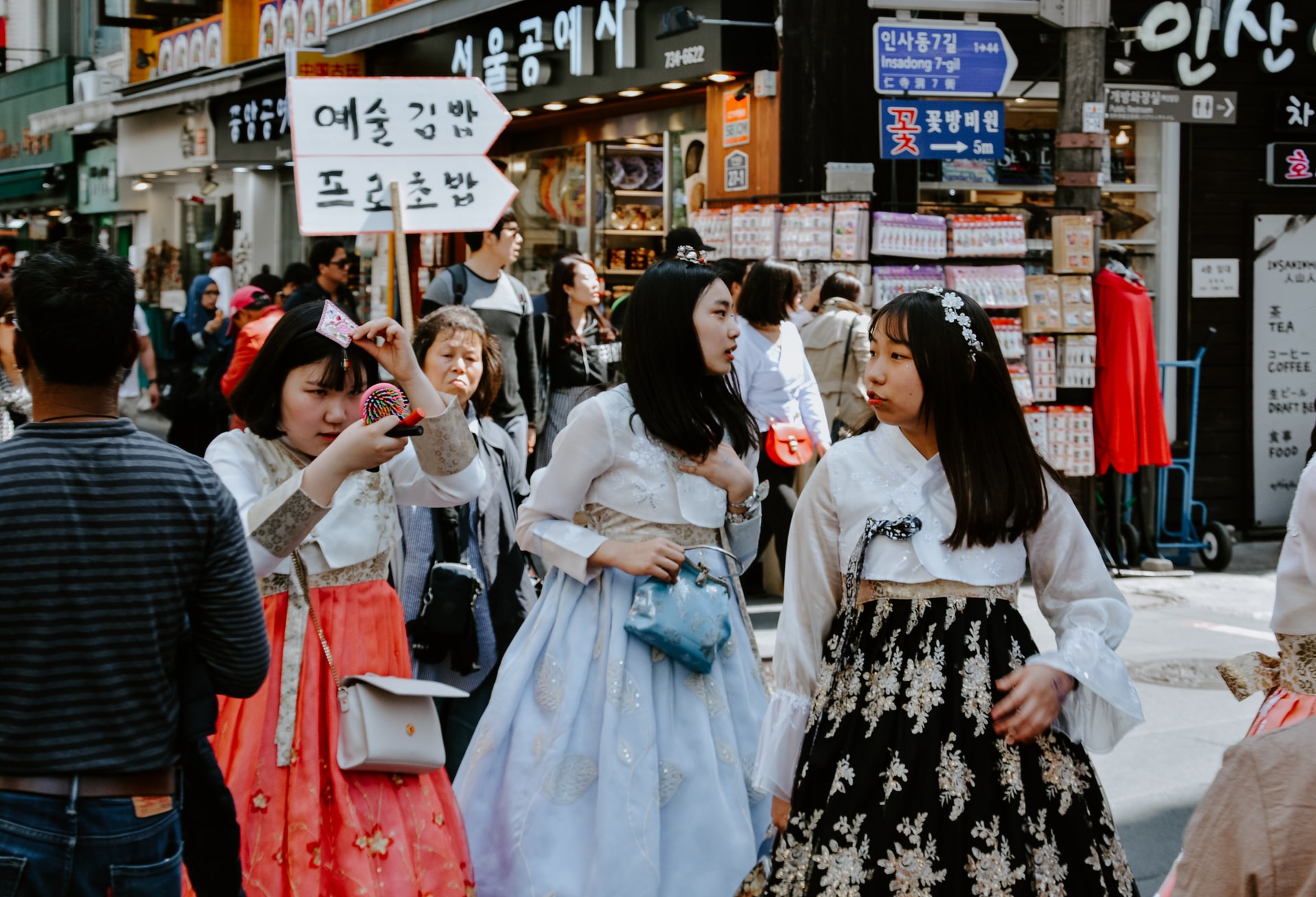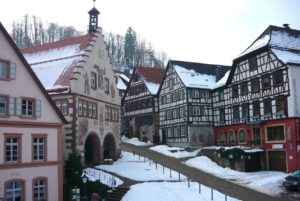Photo by Adli Wahid on Unsplash
In this post we’ll talk about clothing in Korean.
검은색 셔츠를 입어요. geom-eunsaeg shyeocheu-leul ibeoyo. I’m wearing a black shirt.
Let’s start with the basics: 옷 ot (clothes); 셔츠 shyeocheu (a shirt); 바지 baji (pants); 청바지 cheongbaji (jeans); 티셔츠 tishyeocheu (a tee shirt); 벨트 baelteu (a belt); 입다 ipda (to wear on your body; see below); 옷을 입다 os-eul ipda (to get dressed, put clothes on your body); 옷을 벗다 os-eul beotda (to get undressed); 셔츠를 입다 shyeocheu-reul ipda (to put on a shirt), 셔츠를 벗다 shyeocheu-reul beotda (to take off a shirt).
Korean uses a few different verbs meaning to wear or put on, depending on where on your body the article goes:
- 코트/옷 입다
koteu/os ibda
to wear a coat/clothes (or anything on your body) - 모자 쓰다
moja sseuda
to wear a hat (or anything headwear) - 스카프/넥타이 매다
seukapeu/negtai maeda
to wear a scarf/tie (or anything around your neck) - 장갑 끼다
jang-gab kkida
to wear gloves (or anything handwear) - 양말/신발 신다
yangmal/sinbal sinda
to wear socks/shoes (or any footwear)
- (나는) 흰색 셔츠를 입어요.
(na-neun) huinsaeg syeocheu-leul ibeoyo.
I’m wearing a white shirt. - (나는) 주말에 항상 청바지를 입어요.
(na-neun) jumal-e hangsang cheongbaji-leul ibeoyo.
I always wear jeans on the weekend. - (나는) 청바지와 티셔츠를 입어요.
(na-neun) cheongbajiwa tisyeocheu-leul ibeoyo.
I’m wearing jeans and a tee shirt. - 이 청바지는 너무 커요. 벨트가 필요해요.
i cheongbaji-neun neomu keoyo. belteu-ga pilyo haeyo.
These jeans are too big. I need a belt. - 셔츠를 입어요.
shyeocheu-reul ibeoyo.
I’m putting on a shirt. - 청바지를 벗어요.
cheongbaji-leul beoseoyo.
I’m taking off my jeans. - 매일 아침 옷을 입어요.
maeil achim os-eul ibeoyo.
I get dressed every morning. - 자기 전에 옷을 벗어요.
jagi jeon-e os-eul beoseoyo.
I take my clothes off before bed.
블라우스가 예뻐요. beullauseu-ga yeppeoyo. That’s a nice blouse.
Now let’s look at some more vocabulary for less casual clothing: 드레스, 옷 deuleseu, ot (a dress); 치마 chima (a skirt); 블라우스 beullauseu (a blouse); 남성복, 남자 정장 namseongbog, namja jeongjang (a man’s suit); 여성복, 여자 정장 yeoseongbog, yeoja jeongjang (a woman’s suit); 넥타이 negtai (a tie); 정장 재킷 jeongjang jaekit (a suit jacket); 턱시도 teogshido (a tuxedo); 웨딩 드레스 weding deuleseu (a wedding dress).
- 그녀는 직장에서 보통 치마와 블라우스를 입어요.
geunyeo-neun jigjang-eseo botong chimawa beullauseu-leul ibeoyo
She usually wears a skirt and a blouse at work. - 그녀는 검은 치마와 하얀 블라우스를 입어요.
geunyeo-neun geom-eun chimawa hayan beullauseu-leul ibeoyo.
She’s wearing a black skirt and a white blouse. - 그는 직장에서 보통 정장에 넥타이를 맨다.
geu-neun jigjang-eseo botong jeongjang-e negtai-leul maenda.
He usually wears a suit and tie at work. - 그녀의 빨간 드레스는 아름다워요.
geunyeo-e ppalgan deuleseuneun aleumdawoyo.
Her red dress is beautiful. - 그는 파란 정장이 많아요.
geu-neun palan jeongjang-i manayo.
He has a lot of blue suits. - 공식적인 행사라서, (그는) 턱시도를 입고 있어요.
gongsigjeog-in haengsalaseo, (geu-neun) teogsihdo-leul ibgo isseoyo.
It’s a formal event, so he’s wearing a tuxedo. - 신부는 아름다운 웨딩드레스를 입고 있어요.
shinbu-neun aleumdaun wedingdeuleseu-leul ibgo isseoyo.
The bride is wearing a beautiful wedding dress. - 그 재킷에 무슨 색 넥타이를 맬 거에요?
geu jaekis-e museun saeg negtai-leul mael geoeyo?
What color tie are you going to wear with that jacket?
추워요! 스웨터를 입어요. chuwoyo! seuweteo-leul ibeoyo. It’s cold! I’m wearing a sweater.
Now let’s look at some clothing you may wear when it’s cold: 스웨터 seuweteo (a sweater); 운동복 상의 undongbog sang-ui (a sweatshirt); 코트, 외투 koteu, oetu (a coat); 재킷, 상의 jaekit, sang-ui (a jacket); 장갑 janggab (gloves); 벙어리 장갑, 엄지 장갑 beongeoli janggab, eomji janggab (mittens); 스카프 seukapeu (a scarf); 모자 moja (a hat); 비옷 biot (a raincoat); 우산 usan (an umbrella); 후디 hudi (a hoodie).
- 추울 때 스웨터를 입어요.
chuul ttae seuweteo-leul ibeoyo.
I put on a sweater when it’s chilly. - 후디를 빌릴 수 있을까?
hudi-leul billil su isseulkka?
Can I borrow a hoodie? - 재킷을 가져 올게요. 오늘 밤은 추울 지도 몰라요.
jaekis-eul gajyeo olgeyo. oneul bam-eun chuul jido mollayo.
I’m going to bring my jacket. It may be chilly tonight. - 그는 항상 청 재킷/ 가죽 재킷/모터싸이클 재킷을 입어요.
geu-neun hangsang cheong jaekis-/ gajug jaekis-/moteossaikeul jaekis-eul ibeoyo.
He always wears a jeans jacket / a leather jacket / a motorcycle jacket. - 추울 때 나는 코트를 입고, 모자를 쓰고, 스카프를 맨다.
chuul ttae na-neun koteu-leul ibgo, moja-leul sseugo, seukapeu-leul maenda.
I wear a coat, a hat, and a scarf when it’s cold. - 장갑/엄지 장갑을 잊지 마세요.
janggab/eomji janggab-eul ijji maseyo.
Don’t forget your gloves/mittens. - 오늘 모자가 필요해요.
oneul moja-ga pilyohaeyo.
You need a hat today. - 아파트가 추워서. 운동복을 입고 있어요.
apateu-ga chuwoseo. undongbog-eul ibgo isseoyo.
It’s cold in my apartment, so I’m wearing a sweatshirt. - 비가 오는데, 우산이 없어요.
bi-ga oneunde, usan-i eobseoyo.
It’s raining, but I don’t have my umbrella. - 오늘 비옷을 입을 거예요.
oneul bios-eul ibeul geoyeyo.
I’m going to wear a raincoat today.
더워요! 반바지를 입어요. deowoyo! banbaji-leul ibeoyo. It’s hot! I’m wearing shorts.
When the weather is hot, you probably want to know how to say: 반바지 banbaji (shorts); 수영복 suyeongbog (a bathing suit); (남자) 수영복(namja) suyeongbog (swimming trunks); 비키니 bikini (a bikini); 탱크탑, 민소매 taengkeutab, minsomae (a tank top); 선글라스 seongeullaseu (sunglasses); 야구모자 yagumoja (a baseball cap).
- 오늘 정말 더워서. 반바지를 입어요.
oneul jeongmal deowoseo. banbajileul ibeoyo.
It’s really hot today, so I’m wearing shorts. - 해변/수영장에 갈 때 수영복을 입어요.
haebyeon/suyeongjang-e gal ttae suyeongbog-eul ibeoyo.
I put on a bathing suit when I go to the beach/pool. - 그는 수영복을 입고, 그녀는 비키니를 입어요.
geu-neun suyeongbog-eul ibgo, geunyeo-neun bikini-leul ibeoyo.
He’s wearing swimming trunks, and she’s wearing a bikini. - 그는 여름에 항상 민소매를 입어요.
geu-neun yeoleum-e hangsang minsomae-leul ibeoyo.
He always wears tank tops in the summer. - 화창한 날이에요. 선글라스 필요하세요?
hwachanghan nal-ieyo. seongeullaseu pilyo haseyo?
It’s sunny. Do you need your sunglasses? - 항상 야구모자를 써요.
hangsang yagumoja-leul sseoyo.
I always wear a baseball cap.
새 신발이 필요해요. sae shinbal-i pilyo haeyo. I need new shoes.
Now let’s look at some footwear: 신발 shinbal (shoes); 양말 yangmal (socks); 운동화, 스니커즈 undonghwa, seunikeojeu (sneakers); 샌들 saendeul (sandals); 플립플랍 peullibpeullab (flip-flops); 부츠 bucheu (boots); 슬리퍼 seullipeo (slippers); 힐 hil (heels); 하이힐 haihil (high heels); 신발끈 shinbalkkeun (shoe laces).
- 검은색 가죽 신발을 신고 있어요.
geomeunsaeg gajug shinbal-eul shingo isseoyo.
He’s wearing black leather shoes. - 그녀는 보통 힐을 신고 출근해요.
geunyeo-neun botong hil-eul shingo chulgeunhaeyo.
She usually wears heels to work. - 주말에는 항상 운동화를 신어요.
jumal-e-neun hangsang undonghwa-leul shineoyo.
I always wear sneakers on the weekend. - 해변에서 플립플롭을 신어요
haebyeon-eseo peullibpeullob-eul shineoyo.
I wear flip-flops at the beach. - 여름에 보통 샌들을 신어요.
yeoleum-e botong saendeul-eul shineoyo.
I usually wear sandals in the summer. - 집에서는 신발을 벗고, 슬리퍼를 신어요.
jib-eseo-neun shinbal-eul beotgo, seullipeo-leul shineoyo.
Please take your shoes off and put on slippers in the house. - 눈이 오면 부츠를 신어요.
nun-i omyeon bucheu-leul shineoyo.
I wear boots when it’s snowing. - 운동화 신어 그리고 우리 농구 하러 가자.
undonghwa shin-eo geuligo uri nonggu haleo gaja.
Put on your sneakers and let’s go play basketball. - 조심해! 신발끈이 풀렸어요.
joshimhae! shinbalkkeun-i pullyeosseoyo.
Be careful! Your shoe laces are untied.
속옷 sog-ot Underwear
Now let’s look at vocabulary for what you wear under everything else: 속옷 sog-ot (underwear); 팬티 paenti (underpants); 내의 naeui (an undershirt); 사각 팬티 sagag paenti (boxers); 팬티 paenti (panties); 브라 (브래지어) beula (beulaejieo) (a bra).
- 속옷을 새로 사야 해요.
sog-os-eul saelo saya haeyo.
I need to buy new underwear. - 빨래를 해야 해요. 깨끗한 팬티가 하나도 없어요.
ppallae-leul haeya haeyo. kkaekkeushan paenti-ga hanado eobseoyo.
I need to do laundry, I don’t have any clean underpants. - 그녀는 브라를 차고 팬티를 입어요.
geunyeo-neun beulaleul chago paenti-leul ibeoyo.
She wears a bra and panties. - 그는 항상 사각 팬티를 입어요.
geu-neun hangsang sagag paenti-leul ibeoyo.
He always wears boxers. - 사각 팬티와 내의를 입고 자요.
sagag paentiwa naeui-leul ibgo jayo.
I sleep in boxers and an undershirt.
이 셔츠는 너무 작아요. i syeocheu-neun neomu jagayo. This shirt is too small.
Here’s some vocabulary that you can use to talk about clothing:
- 신발 사이즈가 어떻게 돼요?
shinbal saijeu-ga eotteoge dwaeyo?
What size shoe do you wear? - 소, 중, 대, 특대 중 무엇을 입어요?
so, jung, dae, teugdae jung mueos-eul ibeoyo?
Do you wear a small, a medium, a large, or an extra-large? - 이 셔츠는 너무 커요/작아요/꽉 조여요/헐렁해요.
i syeocheu-neun neomu keoyo/jagayo/kkwag joyeoyo/heolleonghaeyo.
This shirt is too big/small/tight/loose. - 이 바지는 맞지 않아요.
i baji-neun majji anayo.
These pants don’t fit. - 이 운동화는 아주 잘 맞아요.
i undonghwa-neun aju jal majayo.
These sneakers fit very well. - 이 스웨터는 따뜻하고 편안해요.
i seuweteo-neun ttatteushago pyeon-anhaeyo.
This sweater is warm and comfortable. - 이 신발은 발이 아파요!
i shinbal-eun bal-i apayo!
These shoes hurt my feet! - 그 재킷은 정말 잘 어울려요.
geu jaekis-eun jeongmal jal eoullyeoyo.
That jacket looks really good. - 그 바지는 […]에게 안 어울려요.
geu baji-neun [name]-ege an eoullyeoyo.
Those pants don’t look good on you. - 그 셔츠는 그 바지와 안 어울려요.
geu syeocheu-neun geu bajiwa an eoullyeoyo.
That shirt doesn’t match those pants.
이 옷감이 아주 마음에 들어요. i otgam-i aju ma-eum-e deuleoyo. I love this fabric!
Finally, let’s look at some vocabulary related to fabrics, designs, and more: 면 myeon (cotton); 실크 shilkeu (silk); 모 mo (wool); 가죽 gajug (leather); 줄무늬 julmunui (stripes); 물방울 무늬 mulbang-ul munui (polka dots); 패턴, 양식 paeteon, yangshig (pattern); 단추 danchu (a button); 반소매, 반팔 bansomae, banpal (short-sleeved); 긴소매, 긴팔 ginsomae, ginpal (long-sleeved); 지퍼 jipeo (a zipper); 벨트 버클 belteu beokeul (a belt buckle).
- 줄무늬 셔츠가 좋아요.
julmunui syeocheu-ga johayo.
I like the striped shirt. - 그녀의 블라우스에는 꽃무늬가 있어요.
geunyeo-e beullauseue-neun kkochmunui-ga isseoyo.
Her blouse has a floral pattern. - 그녀는 물방울 무늬가 있는 셔츠를 입고 있어요.
geunyeo-neun mulbang-ul munui-ga itneun syeocheu-leul ibgo isseoyo.
She’s wearing a shirt with polka dots. - 그 셔츠는 무슨 천으로 만들어 졌어요?
geu syeocheu-neun museun cheon-eulo mandeul-eo jyeosseoyo?
What fabric is that shirt made of? - 면만 입어요.
myeonman ibeoyo.
I only wear cotton. - 나의 모직 스웨터는 정말 따뜻해요.
na-e mojig seuweteo-neun jeongmal ttatteushaeyo.
My wool sweater is very warm. - 그 실크 블라우스는 아름답지만 비싸요!
geu silkeu beullauseu-neun aleumdabjiman bissayo!
The silk blouse is beautiful, but expensive! - 반팔 셔츠를 입었어요 아니면 긴 팔 셔츠를 입었어요?
banpal syeocheu-leul ibeosseoyo animyeon gin pal syeocheu-leul ibeosseoyo?
Are you wearing a short-sleeved shirt or a long-sleeved shirt? - 단추가 떨어졌어요!
danchu-ga tteol-eojyeosseoyo!
My button came off! - 지퍼가 열렸어요!
jipeo-ga yeollyeosseoyo!
Your zipper is open!
Learn Korean with the Language Garage
Check out our other posts on Korean language, culture, and more. And if you’re looking for convenient and affordable live Korean lessons with a real teacher, check out The Language Garage. Our lessons are given online in a virtual classroom, so it doesn’t matter where you live or work – we can come to you. And we have flexible options, with a free trial so that you can decide if there’s a fit. Check us out!






